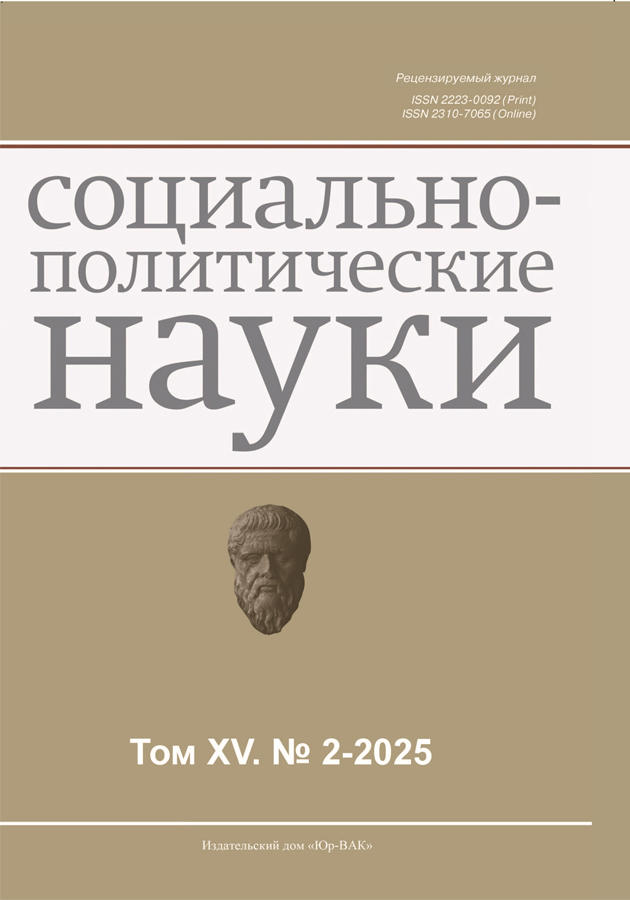Carsharing as a response to the transportation problems of a megalopolis: muscovites’ willingness to embrace the sharing economy
- Authors: Borkovskaya E.I.1
-
Affiliations:
- Financial University under the Government of the Russian Federation
- Issue: Vol 15, No 2 (2025)
- Pages: 164-171
- Section: Economic Sociology
- URL: https://journals.eco-vector.com/2223-0092/article/view/681931
- DOI: https://doi.org/10.33693/2223-0092-2025-15-2-164-171
- EDN: https://elibrary.ru/OBHFTQ
- ID: 681931
Cite item
Abstract
The article analyzes the transport strategies of metropolitan populations in the context of the sharing economy. The aim of the study is to determine how well transport tools are adapted to the needs of urban populations and integrated into the structure of the metropolitan transport system, which will help assess their efficiency and acceptability for society (using Moscow as an example). Particular attention is paid to examining indicators of transport accessibility for residents of the capital in terms of private vehicles and the changing conditions of their use in light of the growing prevalence of new rental forms. The experience of implementing and operating carsharing in Moscow as a sharing-based transport model is analyzed. According to the studied data, Moscow demonstrates a leading position in the development of carsharing on a global scale, with an annual increase in the number of vehicles and users of this service. Due to a rapid growth of the carsharing market, several key trends and forecasts are emerging: the expansion of vehicle fleets by leading carsharing companies, a significant increase in the number of users, the introduction of new technologies facilitating development, growing popularity of sustainable and environmental aspects of carsharing, and the fact that the development of carsharing is directly influenced by legislative initiatives and regulatory changes.
Full Text
About the authors
Ekaterina I. Borkovskaya
Financial University under the Government of the Russian Federation
Author for correspondence.
Email: katrin_borkovskaya@mail.ru
ORCID iD: 0000-0002-2853-2557
SPIN-code: 2484-1850
postgraduate student
Russian Federation, MoscowReferences
- Botsman R. What’s mine is yours. New York: Harper Collins, 2010. 434 р.
- Belokonev S.Yu., Hokonov A.A., Shogenov M.Z. Social effects of shared consumption (sharing economy): Network economic and political communities. Power. 2019. No. 6. Pp. 115–123. (In Rus.). doi: 10.31171/vlast.v27i6.6837. EDN: JADFZD.
- Belyaeva Yu.V. Transformation of consumer behavior in Russia under the influence of information technology development and digitalization of society. Humanities, Socioeconomic and Social Sciences. 2020. No. 3. Pp. 216–218. (In Rus.). doi: 10.23672/SAE.2020.2020.58107. EDN: VMKALN.
- Borkovskaya E.I. Metropolitan carsharing: the attitude of Muscovites to new models of consumption of transport services. Population. 2024. Vol. 27. No. 1. Pp. 60–70. (In Rus.). doi: 10.24412/1561-7785-2024-1-60-70. EDN: PGQAQF.
- Kudrin A.B., Rostova D.V., Kirova I.V. Carsharing: development dynamics, current trends and prospects. Forum of Young Scientists. 2019. No. 1-2 (29). (In Rus.)
- Nesterova S.I. Analysis of the carsharing market in Russia. Bulletin of the Samara Municipal Institute of Management. 2024. No. 2. Pp. 34–48. (In Rus.)
- Studenikin N.V. The impact of digital technologies on social services: World experience and prospects in Russia. Proceedings of Tula State University. Humanities. 2018. No. 1. Pp. 32–36. (In Rus.). EDN: YWZIQQ.
Supplementary files









